Jamie Dimon, CEO of JPMorgan Chase, said the US-listed bank would spend up to $12bn on technology this year. He gave the reason for this in an earnings call in January, saying: “There is global competition. There is non-bank competition, direct lending competition. There is fintech competition, there is PayPal competition. There is a lot of competition and we intend to win and sometimes you need to spend a few bucks.”
The problem for the banks and other traditional financial services providers is the information technology systems they use are reliant on legacy platforms, or are effectively held hostage by niche providers, such as credit cards on mainframe computers that prevent machine learning from accessing the data to recommend efficiencies in other products or syndicated leveraged loans sent by fax machine.
The first wave of cryptocurrency relied on centralised finance (CeFi) wallets and exchanges, such as Coinbase and Gemini, for storing, buying, selling and trading different cryptocurrencies.
Decentralised finance (DeFi) relies on smart contracts operating on a blockchain, often Ethereum, and is a catch-all term for the technologies rebuilding a digital economy for users to trade assets, get loans and store deposits.
DeFi’s potential for impact
For banks, insurers or asset managers grappling with a legacy of platforms and customer-supplier contracts, why does DeFi, or its related terminologies – crypto, blockchain or web3 – matter?
Jacqueline LeSage, head of Munich Re Ventures, the corporate venturing unit of Germany-based reinsurer Munich Re, and co-chair of the Global Finance Council of CVCS, said: “Crypto, DeFi and web3 have the potential to change every vector in venture, from securities, liquidity, governance and founder interests.”

“Crypto, DeFi and web3 have
the potential to change every
vector, from securities, liquidity,
governance and founder
interests, in venture”
Jacqueline LeSage
Head, Munich Re Ventures
Ken Griffin, founder of a large hedge fund and trading platform for traditional securities, this month sold a $1.15bn stake in Chicago-based Citadel Securities to VC firm Sequoia Capital and crypto investor Paradigm, and could now embrace digital currencies.
Matt Huang, founder of Paradigm, told Bloomberg it looked forward to “partnering with the Citadel Securities team, as they extend their technology and expertise to even more markets and asset classes, including crypto”.
These VCs are investing so much because they expect much greater returns even beyond disruption to their own industry. The promise is a rebuilding of the financial economy and making it more efficient and relevant to the virtual or online worlds, as well as physical one.
Up your game
Related are creating digital (micro-)economies for the metaverse through games. By merging games, finance and blockchain (GameFi) business models, and incentive structures in the virtual worlds of games and the metaverse, can be translated to the real world or become a larger part of the economy.
As the Economist noted: “The fact that the applications built on top of blockchains all work with each other and that the information they store is visible to all, harks back to the idealism of the internet’s early architects, before most users embraced the walled gardens offered by the tech giants.”
Power hungry
Blockchains are databases distributed over many computers and kept secure by cryptography. It is both energy and computing power-hungry and cutting-edge in how new advances in, for example, quantum computing might affect security or opportunities.
An undisclosed cryptocurrency investor recently backed Terra Quantum, a Switzerland-based quantum-as-a-service platform, in its $60m series A round led by VC firm Lakestar.
Cybersecurity remains a concern in crypto. Cryptocurrency-based crime hit a new high in 2021, with illicit addresses receiving $14bn during the year, up from $7.8bn in 2020, according to Chainalysis.
The bitcoin network has been the most powerful computing fabric in the world (three years ago it was about a million times more powerful than the most powerful supercomputer).
The value of assets stored in this nascent financial system has climbed from less than $1bn at the start of 2020 to almost $250bn by the end of last year, according to DeFi Llama.
This increase came despite China saying that all cryptocurrency-related business activities within the country were illegal and barred financial institutions from helping crypto investors deposit fiat currency on crypto exchanges. The move was seen by many as an attempt to eliminate competition with Beijing’s new digital currency, the digital yuan, which is set to launch before the Beijing Winter Olympics in February. (see box, Tencent)
Huobi, Binance and OKEx, three of the world’s largest crypto exchanges, which were founded in China, had closed their subsidiaries in China by the end of the year, although local individuals are still able to get around the rules.
Around two-thirds of DeFi assets are hosted by the Ethereum blockchain, which was created around the middle of the last decade as a more general-purpose version of Bitcoin. Bitcoin’s database stores information about transactions in the associated cryptocurrency, providing proof of who owns what at any time. Ethereum stores more information, such as lines of computer code.
The Economist wrote: “Both Bitcoin and Ethereum use a mechanism called ‘proof-of-work’, where computers race to solve mathematical problems to verify transactions, in return for a reward. This slows down the networks and limits capacity. Bitcoin can process only seven transactions per second; Ethereum can handle only 15. At busy times, transactions are either very slow or very costly and sometimes both.”
R3 Corda, another blockchain or type of distributed ledger promoted by Bank of America, HSBC, Intel and Microsoft, is a novel consensus mechanism in which transactions are cryptographically linked and processed in real time rather than blocked together, which can improve performance and become a potential standard for insurers.
Similarly, Ethereum could shift to a more easily scalable mechanism, either through changes at its database or operating level, or through customised versions, such as Quorum, which was pioneered by JPMorgan to be suitable for banks.
A more scalable Ethereum blockchain could emerge if it turned to ‘proof-of-stake’ to verify transactions, or was split through a process called ‘sharding’, or transactions were bundled together.
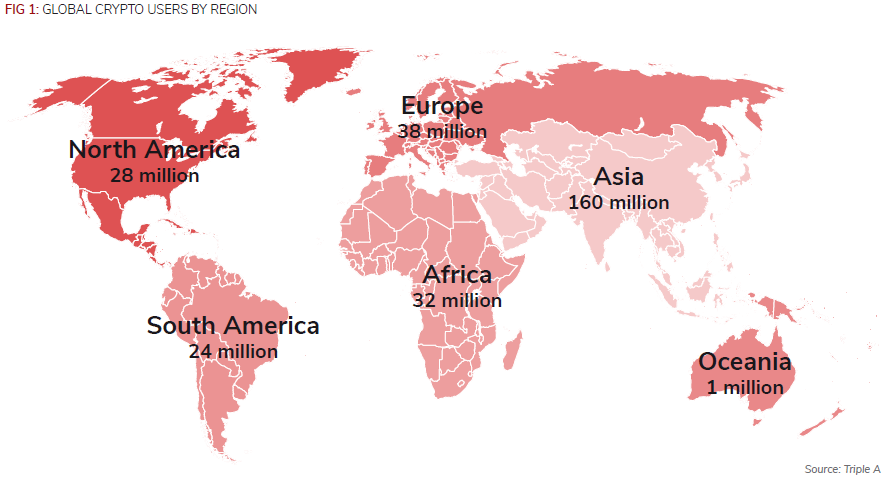
Vulnerable to attack
However, pooling transactions creates centralised entities and a single shard of a blockchain could be more vulnerable to hackers, so Ethereum remains stuck in development, which is negatively impacting its market share as alternatives emerge.
JPMorgan Chase estimated that the share of DeFi applications using Ethereum fell to 70% by the end of 2021, with other networks, such as Avalanche, Binance Smart Chain, Terra and Solana, now using proof-of-stake to run blockchains, enabling them to operate quicker and cheaper.
Decentralised applications (DApps), such as tokens or exchanges, can increasingly operate across blockchains and can scale up by creating ecosystems of support through corporate venturing.
The changes are obvious in other ways, too. In the past year, decentralised autonomous organisations (DAOs), surpassed 1.6 million members in December 2021, up 130-fold from just 13,000 last January, according to data provider DeepDAO. Investment DAOs are collectives of individuals capable of investing their personal capital or directing portions of the DAO’s treasury into early-stage, crypto startups and who buy-in in the form of the DAO’s governance token in exchange for access to private spaces – invite-only Discord chats, Telegram groups or in-person events – where deals can be sourced.
Members of Global Coin Research (GCR), for example, have cumulatively invested in more than 30 deals, deploying more than $25m into projects such as blockchain interoperability protocol Aurora and Web 3 management platform Coinvise, according to news provider CoinDesk.
Raising funds from investment DAOs “helped us in bootstrapping our own community by on-boarding new members through co-hosting events with GCR,” Jenil Thakker, founder of Coinvise, told CoinDesk. “More broadly, investment DAOs offer access to a much wider network of people that can help projects get early feedback.”
Likewise, RevenueCoin works by users buying up the native $RVC token for themselves, with the funds distributed to the high-tech companies often chosen by community voting. Those who had initially bought the token are meant to be able to sell them on traditional exchanges or through buybacks by the startups.
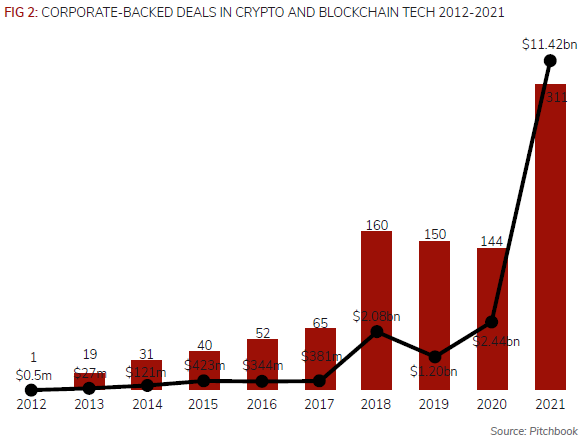
Venture activity explodes
But the investment DAOs are still small-scale compared with traditional corporate and VC investors. VCs invested at least $30bn in crypto projects last year, according to Bloomberg.
Corporate venturers were involved in around a third of these deals by value, according to Pitchbook, dominated by crypto incumbents Coinbase and Digital Currency Group.
Companies specialising in trading, exchange services and lending of digital currencies led the financing rush, taking a large share of the capital (41%), while startups building NFTs (non-fungible tokens), DAOs and web3 came in second, receiving 17% of funding, just above DeFi and other digital infrastructure.
Binance is the largest cryptocurrency exchange in both spot and derivative volumes, followed by OKex, FTX, Huobi, KuCoin, Bybit, Cointiger and Coinbase.
Binance, which was founded in 2017 and initially headquartered in China before moving to the Cayman Islands, had more than $20bn in revenues last year, according to Bloomberg estimates. Its success has fuelled a corporate venturing explosion, backing more than 100 projects in three years through its Binance Labs unit.
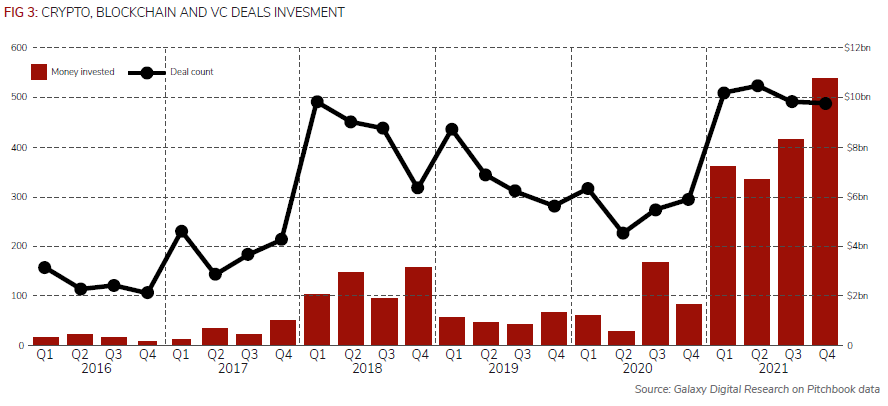
These deals include 1Inch, which helps route trades across blockchains to the best exchange; distributed network BitTorrent; and the $110m series C financing of web3 infrastructure provider Figment.
Ken Li, investment director at Binance Labs, said: “Binance Labs invests deeply in Web3 infrastructure teams.”
Perhaps even more active in corporate venturing since 2018 has been peer Coinbase.
Coinbase Ventures (CV) has invested in more than 150 companies as of August 2021, according to data provider CB Insights, which included its infrastructure deals TaxBit, an automated tool for paying crypto taxes, Zora Labs, a marketplace for digital tokens, Arweave, a digital storage service, and OpenSea, an NFT marketplace, as well as DeFi companies, including Vega Protocol, Saddle, Uniswap, and peers Pintu, Bitso and CoinDCX.
Emilie Choi, president and COO at Coinbase, told CB Insights that investing in competitors was a policy endorsed by co-founder Brian Armstrong.
With an initial capital of $100m announced last year, OKEx’s corporate venturing unit, Blockdream Ventures, also targets basic infrastructure for blockchains and DeFi, as well as web3 and NFTs, among other areas. Its deals by Breeze Liu and Helen Liu from its China team include: Arbitrum, a layer 2 scaling solution for Ethereum developed by Offchain Labs; Gods Unchained, a free-to-play tactical card game that gives players ownership of their in-game items; and Wax, a blockchain for gaming and NFTs. It also claims more daily transactions than any other blockchain in the metaverse.
Even more recently, FTX Trading, a Bahamas-based crypto and blockchain services provider, set up a $2bn corporate venture capital fund and hired Amy Wu from venture capital firm Lightspeed as its head.
FTX Ventures includes the $100m gaming fund launched with Solana in November. Wu said: “We will be folding the Solana gaming funding into FTX Ventures as well. Solana is a close ecosystem partner well beyond the gaming vertical. FTX Ventures will invest across blockchain ecosystems beyond Solana as well.”
The $2bn is the amount of new capital ready to be deployed to builders of the future of web3, across social, gaming, fintech, software and healthcare, not value of the existing portfolio.
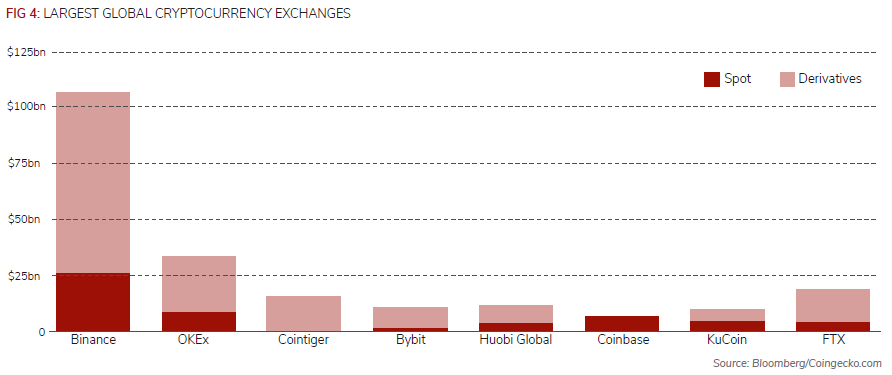
Wu said: “With FTX Ventures, we are looking to support entrepreneurs building generational businesses. We are particularly excited about web3 gaming and its ability to bring mainstream audiences into the ecosystem.”
There are no external limited partners, as the fund is backed by FTX’s CEO, Sam Bankman-Fried, and FTX, according to a company statement. The fund will invest in multi-stage companies and projects, providing flexible funding and strategic support from FTX and its network of global partners.
“Our investors at FTX have made a deep impact in supporting our growth and development. We strive to do the same at FTX Ventures,” said Bankman-Fried.
Likewise, VC firm Andreessen Horowitz (A16Z) plans to raise two crypto funds worth a total of $4.5bn to support its expansion into the digital asset space, as reported by the Financial Times. A16Z has made 40 crypto-related deals between 2016 and 2021, including Ethereum-competitor Solana, NFT marketplace OpenSea and blockchain-based gaming startup Sky Mavis, the studio known for creating NFT-focused metaverse game Axie Infinity. A16Z is also up against more active corporate venturing incumbents.
Founded in 2015, Digital Currency Group (DCG) is one of the most active investors in the blockchain and crypto sectors, “with a mission to accelerate the development of a better financial system through the proliferation of digital assets and blockchain technology,” according to Rumi Morales, who joined as director of investments to lead and expand the US-based crypto exchange’s venture, growth and fund portfolios.
She said: “Today, DCG sits at the epicentre of the industry, backing more than 200 blockchain-related companies in over 35 countries. DCG also invests directly in digital currencies and other digital assets.”
In addition to its investment portfolio, DCG is the parent company of Genesis, a global digital asset prime brokerage, Grayscale Investments, a digital currency asset manager, CoinDesk, a financial media, data and information company, Foundry, a bitcoin miner and staking company, Luno an international cryptocurrency platform, and TradeBlock, an institutional trading platform.
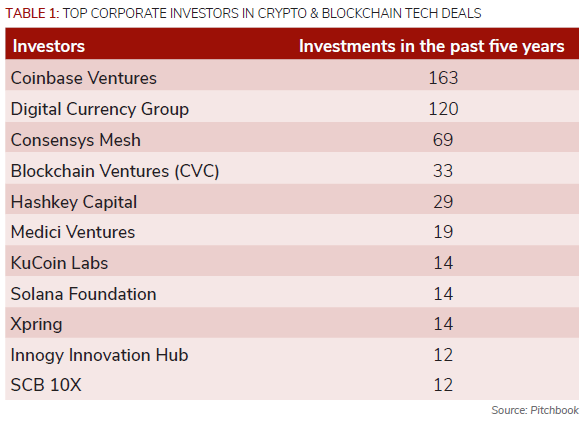
In April 2018, CoinTiger established its Ecosystem Fund to take blockchain equity and token investments, as well as CoinTiger Labs to incubate blockchain projects. The fund has invested in projects including Perlin, Mytoken, Lianyixia, Carry, Carblock and Cocos BCX.
More recently, KuCoin Labs, the investment and research firm spun out of the crypto exchange KuCoin, launched a $100m fund to invest in metaverse startup projects in gaming, NFTs and decentralised infrastructure projects. Its deals include data privacy hub Secret Network’s $400m in ecosystem funding that will set up a $225m ecosystem fund and a $175m accelerator pool.
The ecosystem fund is led by SCRT Labs and, beyond KuCoin Labs, includes DeFiance Capital, Alameda Research, CoinFund, HashKey, Hashed, Arrington Capital, Dragonfly Capital Partners, Fenbushi Capital, Skyvision Capital, Blocktower Capital, Terraform Labs, Hartmann Ventures, NGC Ventures, Figment, Arkstream Capital, Shima Capital, Magnus Capital, Bison Fund, Momentum6, Arca, Iconium, Huobi Ventures and Skynet Trading.
Animoca Brands, another blockchain gaming and trading company with an active CVC unit, having backed more than 150 NFT and metaverse-related companies, including OpenSea, Dapper Labs, Yield Guild Games, Star Atlas, Axie Infinity and Thetan Arena, raised $358.9m in January in its fourth round since May and at a reported $5bn pre-money valuation.
Liberty City Ventures led the round, with other investors including 10T Holdings, C Ventures, Delta Fund, Gobi Partners Greater Bay Area, Gemini Frontier Fund, Kingsway, L2 Capital, Mirae Asset, Pacific Century Group, ParaFi Capital, Provident, Senator Investment Group, Sequoia China, Smile Group, Stable Asset Management, Soros Fund Management, Wildcat Capital Management and Winklevoss Capital.
Huobi Capital supports the eponymous exchange’s corporate venturing deals through Huobi Ventures, such as Blockstack, Theta and Lootex, a GameFi platform to purchase NFTs and in-game assets across multiple blockchains, which raised $9m from a number of venture capital firms and strategic partners, such as Spartan Capital, Infinity Ventures Crypto, LD Capital and Akatsuki.
The Lootex round also saw the participation of SweeperDAO, YGG SEA, Polygon Studio, HTC, OKEx Blockdream Ventures, Avocado Guild, Cherubic Ventures, Palm Drive Capital, Evernew Capital, Morningstar Ventures, NGC Ventures, Petrock Capital, Panony, Yolo Investments, Kosmos Ventures, Daedalus and, from PKO Investments syndicate, angel investors Kevin Lin, Twitch’s co-founder, Holly Liu, Kabam’s
co-founder, Patrick Lee, co-founder of Rotten Tomatoes, and Kun Gao, co-founder of Crunchyroll.
Likewise, founded in 2019 and incubated by quantitative trading firm Alameda Research, FTX had 69 investors in its last round of $421m in October 2021, including SoftBank, payment technology provider Circle and crypto exchanges Coinbase and Binance, as well as a who’s who of financial investors, including Ontario Teachers’ Pension Plan Board’s Teachers’ Innovation Platform, BlackRock, Temasek, Sequoia Capital, IVP, Iconiq Growth, Tiger Global Management, Sea Capital, Ribbit Capital and Lightspeed Venture Partners.
Greater opportunities
The depth of syndicates for the rounds and cross-holdings between new organisations using part of their rounds to back other projects points to an unusual fertility and interconnection. This creates risks but points to a fundamental philosophical underpinning in the web3 movement to gain and retain consent.
Miko Matsumara, co-founder of Gumi Cryptos Capital (GCC), a VC firm where games company Gumi is a cornerstone limited partner, described blockchain as a ”quantum evolution of open source software”, a field he spent decades involved in through startups such as Gradle and Hazelcast and at Java developer Sun Microsystems in the mid-1990s.
He said: “Bitcoin is an insane leap from open source runtime, where developers donate time to write software and give it away. People do this because they have free will and so can choose, but machines do not have free will and so cannot give away their time or computing power. So Bitcoin and blockchains are a way to compensate for runtime. To turn ones into zeros and zeros into ones costs energy, which is money, so mining Bitcoin as proof of work neutralises this, as it is effectively creating money so there is an incentive to download and run software.
“The internet is usually seen as a tragedy of the commons [a problem in economics that occurs when individuals neglect the well-being of society in the pursuit of personal gain], but web3 is a new phase of open culture through NFTs that is creating a better internet; a comedy of commons as it were.
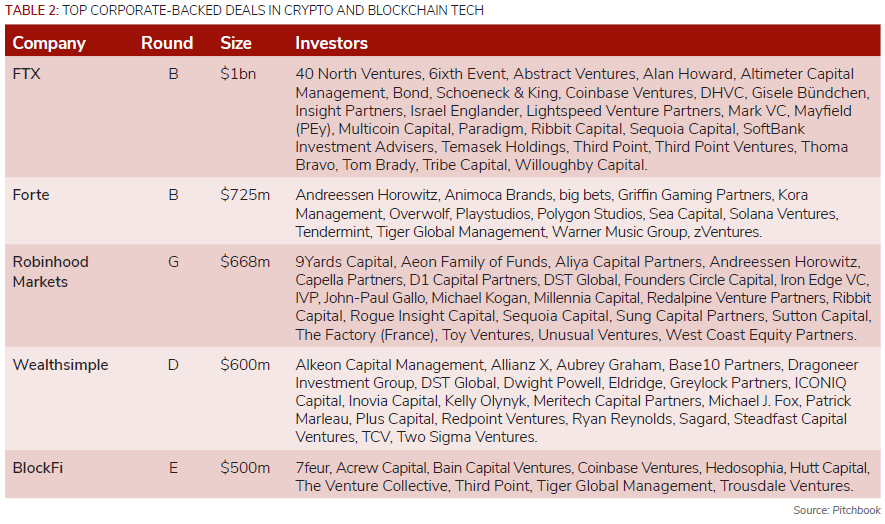
“Now there is competition for consent. Do other developers consent to use your software? Do end users consent to use the applications? If it is useful, there is greater consent so suddenly there are vectors to improve software. Can you compete to create canonical platforms, the Platonic ideal of a database.
“NFTs are a medium to reposit canonical cultural evolution and new capabilities to rebuild the internet and remove tech giants’ externalities.”
Within a year, the total market value for NFTs reached $46bn, representing a nearly 100 times multiple from the $52.3m total market cap in December 2020, according to CoinGecko data used in OpCrypto’s annual report.
“Web 1.0 was read-only,” VC Bill Tai said to CNBC. “Web 2.0 is read-write. Web 3.0 is the instantiation of a wrapper around everything that is coming in and out of the screen so that it can move around. It is an internet of assets.
“You can put land titles on there, real estate, art, drawings, anything. It is the most efficient way over time to assign ownership of any asset,” he said, explaining that everything can have an address that allows people to find it through a marketplace.
But some believe the impact of “a better internet” through web3 and crypto could be even greater through decentralised autonomous organisations or even “cloud nations,” as laid out by Balaji Srinivasan.
Mario Gabriele in his blog, the Generalist, said: “Just as mechanical advancements gave rise to national systems, the technological revolution enables new structures. While the internet was the dominant force in the current shift, cryptocurrency represents the missing piece. Though much discussed, we remain in the early innings of understanding how profoundly the blockchain ‘vernacularises’ economics and empowers digital, censorship-free homesteading.
“The result will be a new type of civilisational structure: decentralised countries. ‘DeCos’ will operate above national borders in the digital realm.
“These unions will be internet native and agnostic to the physical world. They may start by leveraging platforms run by centralised companies, but eventually migrate to a fully decentralised stack to protect their existence. In time, DeCos will attract borderless ‘populations’ that rival and surpass that of many nations. Though much of it will be dominated in vernacular monies, including currencies denominated by the DeCo, these entities will boast large GDPs.”
Regaining trust
In this world of decentralisation, therefore, trust and identity is important.
Austin Arensberg, senior director at corporate venturing unit Okta Ventures, told peer Alex Lazarow: “Startups will be investing in interoperable customer identities underpinned by both open banking and crypto use cases. The excitement around the potential for social auth championed by Facebook 10 years ago will be manifested once again, but this time by fintech players. Customers want their financial identity to be transferred seamlessly and securely across the web. One click checkout tools and crypto wallets will be important battlefields to watch.”
Gen Tsuchikawa, chief investment manager at Sony Innovation Fund, said: “Financial and insurance technologies will increasingly blend blockchain and web3 together. [For example,] a number of DeFi new entrants are likely going to take the opportunity to dislodge neobanks and challenger insurers with more differentiated products leveraging on blockchain. This opens an even broader opportunity than just the decentralisation of monetary flow, as a deeper reconfiguring of credit scoring, identity verification and fraud prevention could be powered by web3.”
UK-based Checkout.com, which recently raised $1bn at a $40bn valuation and hired Meron Colbeci, Meta’s previous digital wallet lead, as its chief product officer, has also expanded into the crypto space and processes payments for exchanges such as Coinbase and FTX.
Lazarow, a venture capitalist with Cathay Innovation, added: “My own prediction is about the continued global opportunity for fintech. For context, in 2021 we saw the rise of fintech unicorns around the world. Most of that action has been in emerging markets. At the beginning of 2021, Africa had one unicorn. Today it has seven. The six additions were in fintech. Latin America (see box, Latam takes off), saw the historic IPO of Nubank. Europe was the source of some of the largest financings.”
The financial technology underpinning the world is shifting at pace.
Tencent: Expanding the Global portfolio
Tencent has dodged most of China’s regulatory crackdown and built an impressive global fintech portfolio.
There is an elite band of venture investors who have returned more than $100bn in profits from their deals. When asked who they rate and why, they often cite Forest Lin who, along with Jeffrey Li, took China-based gaming and internet group Tencent’s corporate venturing portfolio to be valued at nearly $300bn, excluding realisations, such as the $16bn of shares in JD.com in December 2021.
Lin became president of Tencent’s then-nascent financial technology group just before the covid-19 pandemic started. Li remained as sole general or managing manager of Tencent Plus Partners and became corporate vice-president in summer 2019.
Tencent’s latest deal in this area came just before the new year, when it joined a $600m funding round for UK digital bank Monzo.
Tencent’s fintech deals include a who’s who of startups, including Rakuten, Nubank, Uala, N26, Lunar, Qonto, Tyme, Ozow, Viva wallet, Airwallex, Fenbeitong and Lydia.
Revenues from Tencent’s FinTech and Business Services unit increased by 40% on a year-on-year basis to RMB41.9bn ($6.6bn) for the second quarter of 2021.
Tencent recorded net other gains of RMB20.8bn for the second quarter of 2021, compared with RMB8.6bn on a year-on-year basis, mainly due to increased valuations of investee companies in fintech and other sectors, such as transportation and local services, and before recent uplifts, such as Brazilian digital bank Nubank’s flotation on the New York Stock Exchange in December. Shares rose 15%, valuing the company at $45bn and making Tencent’s 8.1% stake worth about $3bn.
Tencent has built its portfolio internationally and continues to invest almost all its free cashflow in corporate venturing.
During the six months ended 30 June 2021, Tencent invested RMB42bn in listed and unlisted entities. The fair value of these investments in associates which are listed entities was RMB1,145bn in June 2021 (RMB981bn on 31 December 2020), excluding potentially another $100bn in unlisted holdings for a total portfolio of 800 companies.
Robin Zhu, an analyst at Sanford C Bernstein asset managers, estimated Tencent’s listed and unlisted investments were worth $259bn in total as of 2 March 2021).
Even before these latest results and investments, Morgan Stanley valued Tencent’s own fintech business at $157bn, which means that even if its position is eventually affected by China’s use of a digital currency for electronic payments and regulatory crackdown its global eminence is secure.
Decentralised Autonomous Organisations
By Livine.Sanchez, Zycrypto.com
A decentralised autonomous organisation (DAO) is a blockchain-based organisational structure or group, organised around a shared mission, goal, or cause that coordinates through a shared set of rules enforced by the blockchain.
It is a system that enables individuals to coordinate and self-govern themselves, led by a set of self-executing rules deployed on a public blockchain, with no central decision-making authority.
A DAO is typically referred to as an internet-native business collectively owned and governed by its members. It is also commonly described as a digital collective or cooperative. Generally, DAOs are curated with a central treasury and no individual has the authority to access or control it without the approval of a larger group of persons. Every decision in the digital cooperative is made through proposals and voting to ensure equity and allow members to have a voice.
So far, DAOs are being used for many purposes, such as investment, charity, fundraising, borrowing, or buying NFTs. DAOs are structured without the need for intermediaries or third parties. These organisations can accept donations from almost anyone, anywhere at any time and members can decide and vote on fund allocation.
DAOs could be the next wave of huge growth for the blockchain industry. It would also facilitate more widespread adoption, leading to potential competition with traditional businesses and organisations.
LatAm takes off
The Inter-American Development Bank believes that the value of the technology sector in the region grew from $7bn in 2010 to $221bn in 2020.
Most of the innovation so far has been in fintech, led by Nubank, a Brazilian startup which listed in New York in December 2021. With almost 50 million users, it has become the world’s biggest digital bank, valued at more than $40bn.
Five banks control more than 80% of the market in Brazil, but unmet demand for credit for small- and medium-sized enterprises is more than $650bn.
In 2020, Brazil’s central bank introduced a series of rules to foster transparency and competition in finance. Customers can now compare services and transfer more easily between providers.
It also launched Pix, an instant payment system and paid covid-19 stimulus money digitally. This meant that an estimated 40 million unbanked people signed up for traditional and digital accounts in Brazil, Colombia and Argentina.
The Central Bank of Brazil authorised the issuance of tokens, on blockchain within the national financial system.
To capitalise and compete with Nubank and others, the main incumbent banks, Banco do Brasil, ABC and Itaú, have set up corporate venture capital funds.
Itaú used its CVC unit, Kinea, to back Liqi, a local blockchain-based asset tokenisation startup, in its R$27.5m series A round.
